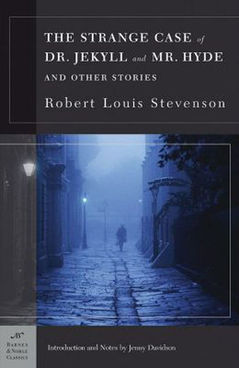 Written by Lauryn Smith Everyone knows Jekyll and Hyde. They have been portrayed everywhere, from Broadway’s stage to PBS’s Arthur. The story of Jekyll and Hyde is unprecedented, a tale depicting an omnipresent internal struggle—good versus evil. Despite its spread, it was not until recently that I actually read Robert Louis Stevenson’s “The Strange Case of Dr. Jekyll and Mr. Hyde.” Heck, I listened to the audiobook before finally venturing into text itself. When they are hanging out in your “to read” pile, Stevenson’s stories can be daunting. Sure, his works are classics. But they are also from the nineteenth century, so the language is not the most accessible to modern readers. Or so I thought. We will talk about that in a moment, but first, let’s get familiar with the story. Described as both a thriller and an allegory, “The Strange Case of Dr. Jekyll and Mr. Hyde” is an anecdote that demonstrates the duality of man. Predominantly told from the viewpoint of the honorable lawyer Gabriel John Utterson, the story depicts the struggle of Henry Jekyll, a highly respected doctor with suppressed desires that go against public mores. A man of chemistry, Jekyll concocts a potion that he uses to transform himself, to free his repressed, more wicked self, whom he calls Edward Hyde. Stevenson masterfully exposes a difficult-to-accept life truth in this seemingly simple, and now abundantly familiar, narrative. Every person is multifaceted, however some personality traits are socially acceptable while others are not. Therefore, people tend to live dually—one self is confidently presented to the world, the other is bottled up and inhibited for fear of ostracism.
Even though the story takes places during Stevenson’s time, the message is still wholly relevant. How often do you see people acting unabashedly silly? Taking casual strolls in their birthday suits? Biting restaurant workers because their orders are wrong? Sure, these things happen, but not often because the results are often poor. So Stevenson presents a timeless conundrum—how to balance one’s good self with one’s bad? Is there even really a difference between the two? Is humankind prone to this hypocrisy of the self? Though subtler than the “good versus evil” theme, other moral messages can be found throughout “The Strange Case of Dr. Jekyll and Mr. Hyde.” Take, for instance, Utterson’s respect for his good friends, a respect that disallows him from speaking against them unnecessarily, a respect that persuades him to obey their wishes despite his inclinations to the contrary. These subtleties speak volumes; Stevenson’s craftsmanship is quite noteworthy. Yes, some of Stevenson's writing is convoluted, particularly when the story is being told from the perspectives of Utterson’s companions. This facet is forgivable, though, as it is not uncommon for older works to border on poetic. But like I alluded earlier, it turns out that Stevenson spins some fine sentences, and he writes truly exceptional similes and metaphors, reminding readers of the delight it is possible to take in language. Try this on for size: “… and whatever he had done, Edward Hyde would pass away like the stain of breath upon a mirror.” And this: “… but Hyde was indifferent to Jekyll, or but remembered him as the mountain bandit remembers the cavern in which he conceals himself from pursuit.” Chills. For a man who spent much of his time imitating the writing styles of the authors he admired, Stevenson proves that his own style is estimable in its own right. Not only does he have a unique flare, he has abundant imagination and fine control over it. Due to its fame, it is arguably impossible to read “The Strange Case of Dr. Jekyll and Mr. Hyde” without some idea of the story’s key plot twist. Imagine what it would have been like to read this book when it was first published! That the story remains read-worthy, even now that its key premise is thoroughly indoctrinated as a metaphorical staple, is a testament to Stevenson’s talent. Stevenson’s themes are straightforward. His prose is playfully artful. Fans of classics will immediately appreciate “The Strange Case of Dr. Jekyll and Mr. Hyde.” For those of you who are hesitant to pick up this one, I suggest first reading Nancy Horan’s historical fiction novel “Under the Wide and Starry Sky,” which provides a detailed perspective on Stevenson’s life. I can say from experience that afterwards you will be inclined to read every book Stevenson has ever written. Next on my Stevenson list: “Treasure Island.” Title: The Strange Case of Dr. Jekyll and Mr. Hyde and Other Stories (Barnes & Noble Classics Series) Author: Robert Louis Stevenson Publisher: Barnes & Noble Publication date: October 1, 2003 Original publication date: January 5, 1886 Page count: 320 List price: $3.95 ISBN: 978-1593080549
0 Comments
Your comment will be posted after it is approved.
Leave a Reply. |

Enjoying my book reviews? If you’ve found them helpful or simply love diving into a good book, consider supporting my caffeine-fueled reading sessions! Your contribution helps keep the reviews coming and ensures I stay wide awake for those late-night reading marathons. Cheers to a shared love for literature! ☕️
Categories
All
|
